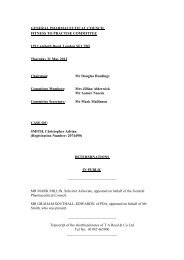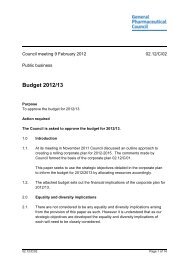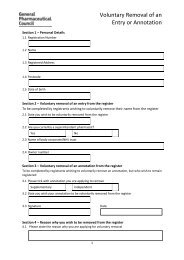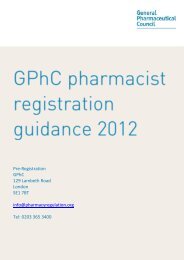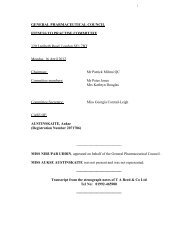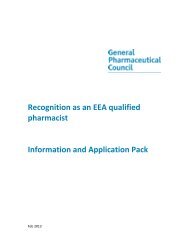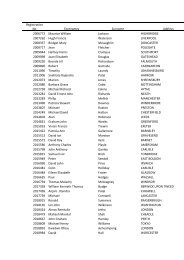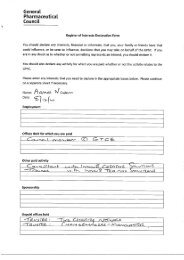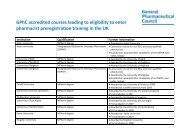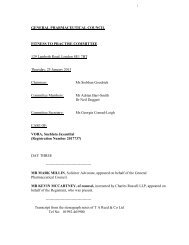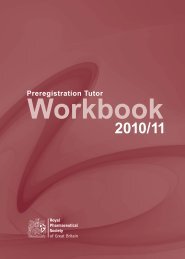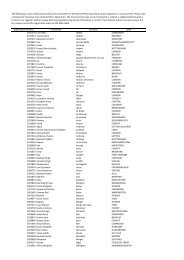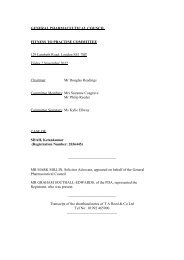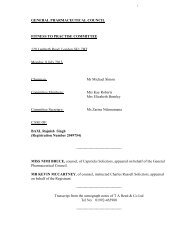Autumn pre-reg bulletin 2010 faq.pdf - General Pharmaceutical ...
Autumn pre-reg bulletin 2010 faq.pdf - General Pharmaceutical ...
Autumn pre-reg bulletin 2010 faq.pdf - General Pharmaceutical ...
You also want an ePaper? Increase the reach of your titles
YUMPU automatically turns print PDFs into web optimized ePapers that Google loves.
Pre-<strong>reg</strong>istration<br />
Bulletin<br />
<strong>Autumn</strong> <strong>2010</strong><br />
Welcome to the first of two <strong>bulletin</strong>s that you<br />
will receive during your <strong>pre</strong><strong>reg</strong>istration training.<br />
The <strong>General</strong> <strong>Pharmaceutical</strong> Council (GPhC) replaced the<br />
Royal <strong>Pharmaceutical</strong> Society of Great Britain as the<br />
<strong>reg</strong>ulator for pharmacists, pharmacy technicians and<br />
pharmacy <strong>pre</strong>mises in September <strong>2010</strong>.The GPhC has<br />
taken over statutory responsibility for all <strong>reg</strong>ulatory<br />
matters and holds and maintains the <strong>reg</strong>ister of<br />
pharmacists, pharmacy technicians and pharmacy<br />
<strong>pre</strong>mises.<br />
GENERAL INFORMATION CONTACTS<br />
Please quote your trainee reference code when you<br />
contact us in writing by e-mail or post with<br />
your queries. Include a postal address where you<br />
require information to be mailed to you and send us a<br />
stamped self-addressed envelope. Contact us by phone<br />
for very urgent queries only.<br />
<strong>General</strong> <strong>Pharmaceutical</strong> Council (GPhC)<br />
Pre-<strong>reg</strong>istration Division, Regulation Directorate,<br />
129 Lambeth Road, London SE1 7BT<br />
<strong>pre</strong><strong>reg</strong>@pharmacy<strong>reg</strong>ulation.org / 020 3365 3620<br />
CONTENTS<br />
<strong>General</strong> information<br />
Registration Examination<br />
Information<br />
Cross Sector Experience<br />
CPD<br />
Trainee Noticeboard<br />
Tutor Noticeboard<br />
REGISTRATION<br />
EXAMINATION INFORMATION<br />
Dates for 2011 Registration<br />
Examination sittings<br />
Summer Examination:<br />
Friday 24 June 2011<br />
Deadline for receipt of entries:<br />
Friday 13 May 2011<br />
<strong>Autumn</strong> Examination:<br />
Friday 23 September 2011<br />
Deadline for receipt of entries:<br />
Friday 12 August 2011<br />
Open book references for 2011<br />
British National Formulary: Edition<br />
60 – September <strong>2010</strong><br />
Drug Tariff for England & Wales or<br />
Scotland: April 2011 edition<br />
Medicines, Ethics and Practice:<br />
Number 34 – July <strong>2010</strong><br />
Standards of Conduct, Ethics &<br />
Performance: September <strong>2010</strong><br />
IMPORTANT NOTICE<br />
The Standards of Conduct,<br />
Ethics & Performance<br />
booklet is enclosed with<br />
this mailing
2 PRE-REGISTRATION BULLETIN<br />
Contents:<br />
Page 01....... Reference Sources<br />
Page 02 ...... CPPE packs<br />
Page 04 .......Registration Examination<br />
Centre for Pharmacy<br />
Postgraduate Education<br />
(CPPE) Packs [England]<br />
CPPE will contact you directly with<br />
information about learning packs & events<br />
on offer. For further information, please<br />
contact CPPE at info@cppe.ac.uk.<br />
Page 11 .......Cross Sector Experience<br />
Page 16 .......CPD<br />
Page 18 .......Trainee Noticeboard<br />
Page 19 .......Tutor Noticeboard<br />
Page 20 .......Other Useful links/contacts<br />
IMPORTANT REMINDERS<br />
• PLEASE REMEMBER: When sending in your Change of Training Details form to notify us of a<br />
change of tutor, you must also send in a new Learning Contract form.<br />
• You cannot swap to another training provider once you have started training unless you<br />
have achieved a minimum of a satisfactory 26-week Progress Report, your current<br />
employer approves of the transfer and this is approved by the GPhC.<br />
• Please refer to the GPhC website for information on the Inspector’s Talks for <strong>2010</strong>/11.<br />
• We recommend that all trainees should attend at least two Local Practice Forums during<br />
their training year. Ask your tutor for details about when and where these meetings are<br />
held, or e-mail your Local Practice Forum Facilitator (contacts on page 20) for details.
NHS Education for Scotland (Pharmacy) Training<br />
All <strong>pre</strong><strong>reg</strong>istration trainees undertaking their training in Scotland are able to use the<br />
services supplied by NHS Education for Scotland (NES), which provides education and<br />
training programmes including face-to-face courses, distance learning, video conferencing<br />
and open learning opportunities. There is no restriction on access to this service. For further<br />
information, visit www.nes.scot.nhs.uk/pharmacy.<br />
Welsh Centre for Post-Graduate <strong>Pharmaceutical</strong><br />
Education (WCPPE)<br />
The WCPPE provides continuing education activities in the form of e-learning and distancelearning<br />
continuing education programmes, flexible and part-time learning programmes,<br />
and access to learning resources. Trainees based in Wales should contact WCPPE for further<br />
information by email at WelshCPPE@cardiff.ac.uk<br />
or by phone on 029 2087 4784, web address: www.cppe.org.uk<br />
3<br />
Reference Sources<br />
The BNF for Children (cBNF) is now a compulsory reference source, but is<br />
not a text for the open book Registration Examination.
4 PRE-REGISTRATION BULLETIN<br />
REGISTRATION EXAMINATION INFORMATION<br />
Before the Examination.......<br />
Ensure that you are thoroughly familiar with the open book reference sources.<br />
Remember when answering questions in the open book paper to read monographs and<br />
passages thoroughly to ensure that you pick up or apply the correct pieces of<br />
information. Assumptions based on practice situations may be misleading.<br />
Keep abreast of changes in all aspects of pharmacy related knowledge. You may be<br />
asked about advice and guidance which may have been recently published.<br />
Do not listen to rumours. From time to time, we are made aware of incorrect<br />
examination related information being passed around. We suggest you check the source<br />
and content of any rumours you hear against information in the <strong>pre</strong><strong>reg</strong>istration<br />
materials and <strong>bulletin</strong>s. If these contradict the rumour, ignore it and trust information in<br />
any official documents sent to you from the GPhC or <strong>pre</strong>viously by the RPSGB.<br />
Required Passmark. In order to pass the examination, you must achieve 70% overall and<br />
70% in the section of 20 calculation questions. Further information on the designated<br />
passmark can be found on page 161 of your Workbook.<br />
Allowable Annotations. In order that candidates and invigilators are clear as to exactly<br />
what is acceptable, the follwing guidance is given by the Examiners:<br />
The text printed may be supplemented by hand written (not printed) highlights, tabs,<br />
corrections and comments. The intention is that the annotation should complement<br />
the purposes of the adjacent text and therefore the inclusion of additional material<br />
including photocopies is not allowed.<br />
Invigilators will carry out spot checks as candidates enter the examination to remove any<br />
additional printed materials from candidates’ reference sources. A report of any found<br />
will be made and passed to the Examiners.<br />
Are you undertaking training or eliglible for the examination sitting in<br />
Scotland Candidates who will be sitting the Registration Examination in Scotland may<br />
make a request for a copy of the Drug Tariff (Scottish edition) by sending an e-mail to<br />
nss.evadis@nhs.net before 29 April 2011, quoting their full name, trainee reference<br />
code, postal address (including postcode) and details of training site.
5<br />
REGISTRATION EXAMINATION INFORMATION<br />
Format<br />
All questions in the examination will be of a<br />
multiple choice (MCQ) format. The structure of<br />
the two papers will be:<br />
Morning:<br />
Closed book<br />
90 questions in 90 minutes (1.5 hours)<br />
No reference material can be used.<br />
Afternoon:<br />
Open book<br />
80 questions in 150 minutes (2.5 hours) - 60<br />
non calculation and 20 calculation.<br />
The calculation questions will be grouped<br />
together as a section of the open book paper<br />
(although not all of them will require the use of<br />
reference sources). Candidates will be able to<br />
use the 2.5 hours of the open book paper as<br />
they see fit, spending more or less time on the<br />
calculation or non-calculation sections as suits<br />
their own strengths and <strong>pre</strong>ferences.<br />
Do not leave it until last minute to look at the<br />
examination syllabus!<br />
Reference Sources<br />
REMEMBER:<br />
We are unable to provide you with<br />
copies of the reference sources.<br />
No compensation can be given by the<br />
Examiners for different answers<br />
resulting from the use of the wrong<br />
editions of these reference sources.<br />
Make sure you keep the correct editions<br />
for the examination once they are no<br />
longer needed in the pharmacy.<br />
You may only take one edition/copy of<br />
each reference source into the<br />
examination. Questions in the open<br />
book examination will be based on the<br />
July <strong>2010</strong> edition of the Medicines,<br />
Ethics and Practice Guide.<br />
The closed book paper may include<br />
questions on current law and ethics.<br />
This potentially includes changes made<br />
since the publication of the MEP in July<br />
<strong>2010</strong>. Such changes may be tracked via<br />
updates and announcements in The<br />
<strong>Pharmaceutical</strong> Journal. They will also<br />
be accessible on the GPhC website<br />
under law and ethics at<br />
www.pharmacy<strong>reg</strong>ulation.org.<br />
Standards of conduct, ethics and<br />
performance booklet: please refer to<br />
the important notice on the front page<br />
(page1) of this <strong>bulletin</strong>.
6 PRE-REGISTRATION BULLETIN<br />
Entering the Examination...<br />
First Time Candidates<br />
Following a satisfactory third progress review<br />
(PR3) in order to be entered for the 2011<br />
examination sittings as a first attempt, you<br />
must submit the following:<br />
- Examination entry form<br />
- A satisfactory 39 week Progress Report<br />
- Examination Fee Payment form<br />
- Two (2) certified photographs<br />
Receipt for fees<br />
When your examination fee has been received,<br />
a letter of receipt will be sent to you with your<br />
<strong>reg</strong>istration pack. Please retain your receipt as<br />
proof of payment as some employers may<br />
reimburse examination fees paid by trainees.<br />
Photographs<br />
Two certified photographs are required in<br />
order for invigilators to check the identity of<br />
candidates <strong>pre</strong>senting themselves at<br />
examination centres. Incorrect or incomplete<br />
wording certifying photographs is the most<br />
common reason for returns of examination<br />
entries to candidates. To avoid this, follow the<br />
example illustrated on page 168 of your<br />
Workbook.<br />
Third Time Candidates<br />
In order to be entered for the 2011<br />
examination sittings as a third attempt you<br />
must submit:<br />
- Examination entry form<br />
- Examination Fee Payment form<br />
- Two (2) certified photographs<br />
- Declaration by Supervising Pharmacist*<br />
*<strong>pre</strong>viously sent to confirm your six months<br />
work placement<br />
Posting of entry documents<br />
We recommend that you obtain a Certificate<br />
of Posting from the post office (at no cost)<br />
when posting your examination entry<br />
documents. You may need it later as proof of<br />
posting. Also ensure you pay sufficient<br />
postage to avoid your mail being returned to<br />
you by the Post Office. If you would like<br />
confirmation that your documents have been<br />
received you must include a stamped selfaddressed<br />
postcard in your mailing.<br />
Please post your documents to the usual<br />
Pre<strong>reg</strong>istration Division address as printed on<br />
the front of this <strong>bulletin</strong>.<br />
Second Time Candidates<br />
In order to be entered for the 2011<br />
examination sittings as a second attempt, you<br />
must submit:<br />
- Examination entry form<br />
- Examination Fee Payment form<br />
- Two (2) certified photographs
7<br />
Frequently asked questions about the Examination<br />
The following are frequent general questions asked of the Pre<strong>reg</strong>istration Division about<br />
the Registration Examination. Most of these answers can be found in the Trainee<br />
Workbook. You should always refer to that source and the <strong>bulletin</strong> before contacting us.<br />
Q. I have been sick for X weeks. Will my<br />
entry to the Examination be affected and<br />
will I have to extend my training period<br />
A. The maximum length of time a Trainee is<br />
permitted to be absent (combined sickness<br />
and annual leave) during a 52 week period is<br />
30 days (6 weeks). You will be required to<br />
extend your training period if you exceed<br />
this. You are required to complete 45 weeks<br />
of training prior to the date of the<br />
examination to be elIgible for a sitting.<br />
Q. When I send in my Registration<br />
Examination entry documents, how do I<br />
know the Pre<strong>reg</strong>istration Division has<br />
received it<br />
A. To confirm receipt of your<br />
documentation, you must send us a<br />
stamped self-addressed postcard with your<br />
entry documents. We will return this to you<br />
date stamped. It is not possible to confirm<br />
receipt of documents over the telephone<br />
because of the vast quantity we receive<br />
within a short space of time.<br />
Q. My tutor has not given me a satisfactory<br />
Progress Report 3. What happens now<br />
A. You will not be permitted to sit the<br />
Registration Examination until you have<br />
achieved a minimum of ‘satisfactory’ with<br />
your Progress Report 3.<br />
Q. Is there any negative marking in the<br />
examination<br />
A. No. Each question carries one mark for a<br />
correct answer. There is no mark for a<br />
wrong answer.<br />
Q. When will I receive details about my<br />
examination centre<br />
A. These details are normally sent in April<br />
for the Summer Examination and in August<br />
for the <strong>Autumn</strong> Examination sitting. All<br />
eligible trainees are provisionally allocated<br />
to an examination centre. However,<br />
trainees are required to submit the<br />
Examination Entry form and other<br />
documents by the closing date (refer to<br />
pages 1&6 of this <strong>bulletin</strong>, page 167 of your<br />
Workbook). Trainees who do not submit an<br />
application will not be entered for the<br />
examination.
8 PRE-REGISTRATION BULLETIN<br />
Medicines, Ethics and Practice Guide (July <strong>2010</strong>)<br />
A new version of the GPhC’s (formerly RPSGB)<br />
Code of Ethics for Pharmacists and Pharmacy<br />
Technicians, which is contained within the<br />
MEP, came into effect on 1 August 2007. You<br />
are reminded that any sample Registration<br />
Examination papers produced prior to<br />
<strong>Autumn</strong> 2007 will be based on the old Code of<br />
Ethics and Professional Standards & Guidance<br />
and may contain questions that cannot be<br />
answered using the current edition of the<br />
Calculation questions<br />
To pass the Registration Examination, you<br />
must achieve 70% overall (an average of the<br />
open and closed book papers) and 70% in<br />
the section of 20 calculation questions (see<br />
examination guidance notes in your Trainee<br />
Workbook). The Pre-<strong>reg</strong>istration Division<br />
provides three sets of calculation questions<br />
to trainees during the training year:<br />
- One set of diagnostic calculation<br />
questions on page 170 of the Trainee<br />
Workbook<br />
- One set of calculation questions within<br />
each of the sample papers, one of which<br />
is included within this <strong>bulletin</strong> and one to<br />
follow in Spring 2011<br />
You and your tutor should use the workbook<br />
questions to identify any learning needs you<br />
have in relation to calculating (without a<br />
calculator!), then develop an action plan to<br />
meet these needs. The <strong>bulletin</strong> questions<br />
MEP. Trainees who commenced their<br />
<strong>pre</strong><strong>reg</strong>istration training prior to June / July<br />
<strong>2010</strong> should please note that the Code of<br />
Ethics and the Professional Standards and<br />
Guidance Documents is not printed in the<br />
MEP (July <strong>2010</strong>). It is now referred to as the<br />
Standards of Conduct, Ethics and<br />
Performance and a copy is enclosed with<br />
this mailing.<br />
should then be used to test whether you<br />
have improved to the extent that you are<br />
likely to achieve 70% in the Registration<br />
Assessment calculations section. If not,<br />
further development work needs to be<br />
done. If you are having difficulties with your<br />
calculating abilities, the following may help:<br />
• Prepare well in advance of the<br />
examination and consult the reference<br />
sources suggested in your Trainee<br />
Workbook, pages 185-187 or the Tutor<br />
Information pages 78-80<br />
• Practise calculations at every opportunity<br />
in the workplace using your calculator<br />
only as a tool to check that your<br />
calculations are correct<br />
• Ask your tutor to modify the calculations<br />
provided in your Trainee Workbook to<br />
create further sets of questions to test<br />
you with.
9<br />
Sample examination papers<br />
You will be provided with two sets of sample<br />
Registration Examination papers during your<br />
<strong>pre</strong><strong>reg</strong>istration year. One set is enclosed with this<br />
Bulletin (tutors receive questions and answers) and<br />
another set will be sent with the Spring Bulletin,<br />
closer to the summer examination. We do not supply<br />
past examination papers, as they are not a true<br />
re<strong>pre</strong>sentation of the current Registration<br />
Examination. Please do not contact us for further<br />
sample or past papers. The sample open book and<br />
closed book papers comprise half the number of<br />
questions of the examination itself.<br />
Board of Examiners <strong>2010</strong><br />
The Assessors have reported that candidates who sat<br />
the summer <strong>2010</strong> Registration Examination answered<br />
the following types of questions poorly:<br />
- questions testing a knowledge of basic and<br />
applied pharmacology and pharmacokinetics<br />
- questions testing a knowledge of legal & ethical<br />
requirements as opposed to employer <strong>reg</strong>ulations<br />
- questions relating to medical terminology<br />
The Examiners want to reinforce the fact that<br />
trainees should make themselves familiar with the<br />
practice guidance that appears on the GPhC website<br />
(such as <strong>pre</strong>gnancy testing in the pharmacy); this is<br />
also stated in the Pre<strong>reg</strong>istration Trainee Workbook.<br />
The examination’s<br />
relationship to the<br />
<strong>pre</strong><strong>reg</strong>istration training<br />
year<br />
Over the years, we have become<br />
aware that some trainees worry to<br />
such an extent about the<br />
Registration Examination that they<br />
do not focus enough on developing<br />
their skills. It is worth remembering<br />
that trainees are not eligible to sit<br />
the examination unless they obtain<br />
a satisfactory progress report 3 on<br />
their Performance Standards at 39<br />
weeks. You should ensure that you<br />
put maximum effort into your<br />
training period to demonstrate your<br />
competence to your tutor as well as<br />
in <strong>pre</strong>paration for the examination.<br />
All trainees and tutors need to<br />
understand that a pass in the<br />
Registration Examination does not<br />
necessarily mean that you are ready<br />
to <strong>reg</strong>ister as a pharmacist. Your<br />
tutor needs to be sure that you<br />
have the necessary skills, attitudes<br />
and underpinning knowledge to<br />
work independently as a<br />
professional pharmacist.
10 PRE-REGISTRATION BULLETIN<br />
Further Examination Information<br />
You will receive more information about the examination in the Spring 2011 Bulletin. The<br />
Assessment Manager will assign candidates to examination centres for the summer sitting<br />
in April and you will be sent your allocation by May. Therefore, we would ask you not to<br />
ring / e-mail the Pre-<strong>reg</strong>istration Division in the meantime to ask where you will be sitting<br />
the examination. If you have not received notification of your examination centre by Friday<br />
09 May 2011, or have any other queries <strong>reg</strong>arding the examination, then please contact<br />
the Assessment Manager at <strong>reg</strong>exam@pharmacy<strong>reg</strong>ulation.org or by telephone on<br />
020 3365 3624.<br />
Information for trainees with<br />
disabilities sitting the examination<br />
in 2011<br />
The Examiners consider requests for special<br />
arrangements (known as adjustments) in the<br />
Registration Examination, as per examination<br />
<strong>reg</strong>ulation 3.3. All requests, especially those asking<br />
for additional time in the examination must be<br />
properly corroborated by a medical practitioner<br />
and be correlated with the MCQ format of the<br />
examination and received by the advertised<br />
deadline.<br />
Please look on the GPhC website for further<br />
information if you are considering making a<br />
request for adjustments in the summer 2011<br />
sitting: http://www.pharmacy<strong>reg</strong>ulation.org<br />
The deadlines for adjustment requests are:<br />
01 April 2011 - for the Summer sitting<br />
29 July 2011 - for the <strong>Autumn</strong> sitting<br />
N.B. Adjustments cannot be carried over from one<br />
sitting to another. Trainees must submit a request<br />
by the advertised deadline for every examination<br />
sitting they enter.
11<br />
CROSS SECTOR EXPERIENCE<br />
Although no longer mandatory, all trainees<br />
are expected to gain experience of at least<br />
two patient-centred sectors of practice i.e.<br />
hospital and community. The best way to<br />
achieve this is by underaking a Cross Sector<br />
Experience (CSE) placement. This involves<br />
spending a minimum of two weeks in the<br />
hospital and community sector i.e. two<br />
weeks in hospital for a community<br />
<strong>pre</strong><strong>reg</strong>istration trainee pharmacist and vice<br />
versa. Some employers have chosen to<br />
meet the requirements of the<br />
<strong>pre</strong><strong>reg</strong>istration training programme in a way<br />
that does not include a CSE placement. If<br />
this is the case your tutor must declare at<br />
your final declaration that you have met the<br />
CSE expectation in another way and state<br />
how this has been achieved.<br />
Have you arranged a<br />
placement yet<br />
The GPhC has three Pre-<strong>reg</strong>istration<br />
Training Facilitators to cover England and<br />
Wales. Trainees in Scotland should contact<br />
Stephen Peddie<br />
(pharmacy@nes.scot.nhs.uk) for details of<br />
the national scheme co-ordinated by NHS<br />
Education for Scotland (NES).<br />
The GPhC Pre-<strong>reg</strong>istration Training<br />
Facilitators and the areas they cover are:<br />
NORTH ENGLAND<br />
Elizabeth Horncastle<br />
elizabeth.horncastle@pharmacy<strong>reg</strong>ulation.<br />
org<br />
020 3365 3625<br />
WALES, SOUTH WEST & MIDLANDS<br />
Lisa Gilbert<br />
lisa.gilbert@pharmacy<strong>reg</strong>ulation.org<br />
020 3365 3628<br />
LONDON & SOUTH EAST ENGLAND<br />
Sarah Purdy<br />
sarah.purdy@pharmacy<strong>reg</strong>ulaton.org<br />
020 3365 3631<br />
If you are unsure of which<br />
Training Facilitator to contact<br />
then please email their mailbox at<br />
PTF@pharmacy<strong>reg</strong>ulation.org<br />
quoting your <strong>pre</strong><strong>reg</strong>istration<br />
training code.
12 PRE-REGISTRATION BULLETIN<br />
What if I cannot organise a CSE placement<br />
If you require a placement and you have still not organised one please contact the Training<br />
Facilitators’ mailbox (ptf@pharmacy<strong>reg</strong>ulation.org) before 30 November <strong>2010</strong>. The<br />
facilitators will be able to discuss with you and your tutor alternative ways in which you can<br />
achieve all the requirements of the <strong>pre</strong><strong>reg</strong>istration training programme. If you require a<br />
hospital placement, you can also consider contacting the pharmacy at your nearest private<br />
hospital(s). Feedback from placements in private hospitals has been excellent. It is at the<br />
discretion of the <strong>pre</strong><strong>reg</strong>istration tutor to determine the suitability of the learning<br />
opportunities and supervision available at the hospital. Experience in alternate sectors,<br />
specialist or unapproved sites such as PCT, psychiatric hospital or a pharmacy without<br />
<strong>pre</strong><strong>reg</strong>istration traing approval is highly encouraged but will not be classed as CSE.<br />
When is the best time to do my placement<br />
<strong>General</strong>ly, trainees have found the best time is between the first and third progress reports,<br />
which are conducted at the 13th and 39th weeks respectively. Although the GPhC does not<br />
dictate when you should undertake a placement, it is an expectation that the placement<br />
should be completed before the end of your <strong>pre</strong><strong>reg</strong>istration training year, i.e. by week 52. It<br />
would be sensible to discuss this with both your base tutor and your placement supervisor to<br />
avoid clashes with annual leave etc. CSE will count towards your <strong>pre</strong>-<strong>reg</strong>istration training<br />
where undertaken and you must continue to conduct yourself professionally whilst offsite.<br />
What is the best duration for my placement<br />
There is no definite answer to this: a minimum of two weeks and a maximum of 4 weeks is<br />
recommended. Ultimately, the duration will probably be dictated by convenience and it is<br />
therefore important to prioritise your own learning objectives depending on the length of your<br />
placement. The Regulator has received conflicting feedback from <strong>pre</strong>vious trainees, with the<br />
majority believing that two weeks is sufficient, whilst others are of the opinion that four weeks is<br />
either too long or too short.
13<br />
What hours / days will I be<br />
expected to work<br />
As with your main training base the GPhC<br />
expects you to work 35-45 hours a week.<br />
However as a guide it would be reasonable to<br />
expect to work a similar number of hours to<br />
those expected of you in your normal place of<br />
employment.<br />
The <strong>reg</strong>ulator recommends that you<br />
complete a minimum of 10 working days in<br />
the placement. With <strong>reg</strong>ard to the specific<br />
days worked it would be reasonable for a<br />
community pharmacy to require the<br />
incoming placement trainee to work on a<br />
Saturday as this is part of their normal<br />
business week. Some hospital tutors have<br />
actually requested placements that include<br />
Saturday working as it enables the trainee to<br />
tackle potential dilemmas out of normal<br />
surgery hours that would not be encountered<br />
during the week. It is important that you<br />
discuss and clarify these issues with the<br />
placement supervisor before your placement<br />
starts to ensure that the arrangements are<br />
suitable to all involved. If necessary put the<br />
details in writing beforehand so there is no<br />
doubt of the expectations from either side.<br />
If you participate in weekend working at your<br />
base site and you are due to work a weekend<br />
during your placement it is important to<br />
ensure that this commitment can be fulfilled<br />
either by yourself, the incoming trainee or by<br />
rearranging with another member of staff at<br />
the base site. Remember: Pharmacists are<br />
expected to honour professional<br />
commitments or make suitable alternative<br />
arrangements for provision of service.<br />
How do I plan my<br />
placement<br />
Experience has shown that the trainees who<br />
gain the most from their cross sector<br />
placement are those who have planned what<br />
they would like to cover in advance and also<br />
have a realistic view of what can be achieved<br />
in the time available.<br />
Resource packs relating to both hospital and<br />
community pharmacy can be found on the<br />
website: http://www.pharmacy<strong>reg</strong>ulation.org<br />
The relevant pack can be used as a guide for<br />
planning your placement.
14 PRE-REGISTRATION BULLETIN<br />
The resource pack is only a guide and your<br />
plan will depend on the facilities available at<br />
your placement, the duration of the<br />
placement and your personal learning and<br />
development objectives. It is therefore<br />
important to contact your placement<br />
supervisor before the placement<br />
commences to discuss what will be covered<br />
during your placement. It is also important<br />
to discuss your objectives with your tutor<br />
beforehand to enable him/her to review<br />
these objectives on your return. Several<br />
<strong>reg</strong>ions of the country may run joint study<br />
days for Community and Hospital trainees<br />
incorporating sessions dedicated to the<br />
planning of cross sector placements. These<br />
are organised at a local level, usually<br />
through Hospital Training Leads. CSE<br />
placements in high demand areas may have<br />
been agreed on the basis that attendance<br />
on the day is mandatory so it is important<br />
that you attend if this is applicable. It is also<br />
a really good opportunity to network with<br />
other <strong>pre</strong><strong>reg</strong>istration trainees.<br />
What if I am absent during<br />
my placement<br />
Your supervisor at your CSE placement may<br />
require you to follow set procedures if you<br />
are absent during the period, whether it be<br />
due to sickness or any other reason. You<br />
should check this in advance of your<br />
placement. Whether procedures are in place<br />
or not, you must notify both the placement<br />
supervisor, your base tutor and the GPhC<br />
Pre<strong>reg</strong>istration Training Facilitator at the<br />
time of absence. Guidance on this can also<br />
be sought from the GPhC Pre<strong>reg</strong>istration<br />
Training Facilitators via email:<br />
ptf@pharmacy<strong>reg</strong>ulation.org or by<br />
telephone: 020 3365 3620.
15<br />
What else do I need to do<br />
before my placement<br />
It is important to check whether there are<br />
any specific occupational health or<br />
Criminal Record Bureau (CRB)<br />
requirements at your placement.<br />
Occupational health clearance may be<br />
required for hospital placements and this<br />
may include the need to provide evidence<br />
of up to date vaccinations. It is important<br />
to check this out well in advance of your<br />
start date as it would be very<br />
disappointing to spend a large proportion<br />
of your time waiting for occupational<br />
health clearance. Requirements will vary<br />
from site to site.<br />
How will the GPhC know<br />
whether I have completed<br />
a CSE placement<br />
Information on the dates and the location<br />
of the placement must be included on the<br />
final 52-week declaration. This declaration<br />
must be submitted to the GPhC as part of<br />
the process involved in your <strong>reg</strong>istration as<br />
a pharmacist. For those trainees who have<br />
not undertaken CSE, your employer needs<br />
to ensure that all of the Performance<br />
Standards have still been met. Your tutor<br />
will then need to sign / annotate the<br />
statement on the reverse of the Final<br />
Declaration. An example of such a<br />
declaration is as follows: I am confident<br />
that I have provided the opportunity for<br />
my Pre<strong>reg</strong>istration Trainee Pharmacist to<br />
meet the requirements of the Performance<br />
Standards relating to hospital / community<br />
(delete as appropriate) pharmacy, through<br />
the delivery of a CSE study day (or other<br />
equivalent training).
16 PRE-REGISTRATION BULLETIN<br />
CONTINUING PROFESSIONAL DEVELOPMENT<br />
Continuing Professional Development (CPD)<br />
for pharmacists and <strong>reg</strong>istered pharmacy<br />
technicians became mandatory under the<br />
Code of Ethics in 2005. Standards and<br />
guidance for CPD under the Code of Ethics,<br />
together with a policy for managing noncompliance<br />
were introduced by the Royal<br />
<strong>Pharmaceutical</strong> Society of Great Britain<br />
(RPSGB) on1 March 2009.<br />
The <strong>General</strong> <strong>Pharmaceutical</strong> Council (GPhC)<br />
is the new <strong>reg</strong>ulator for pharmacists and<br />
pharmacy technicians. The GPhC CPD<br />
standard apply equally to all pharmacy<br />
professionals. They are not changed by<br />
factors such as part-time employment, or<br />
working in a position of authority.<br />
Registrants are expected to cover the full<br />
scope of their practice within their CPD<br />
record, including responsibilities such as<br />
superintendent or pharmacist <strong>pre</strong>scriber<br />
and roles in different settings such as<br />
industry and community pharmacy. The CPD<br />
standards state that <strong>reg</strong>istrants must keep a<br />
CPD record either electronically or on paper<br />
and in a format published or approved by<br />
the <strong>reg</strong>ulator and carrying the CPD approval<br />
logo.<br />
The CPD standards require <strong>reg</strong>istrants to<br />
make a minimum of nine CPD entries per<br />
year which reflect the context and scope of<br />
their practice as a pharmacist or pharmacy<br />
technician.<br />
The call and review of CPD records began at<br />
the end of July 2009. Practising pharmacists<br />
and pharmacy technicians must now submit<br />
their CPD record to the <strong>reg</strong>ulator on request<br />
for review by trained CPD reviewers. They<br />
will then receive written feedback on their<br />
record which will assist them in managing<br />
their CPD.<br />
Recording your CPD online at the CPD<br />
website www.uptodate.org.uk is the<br />
<strong>pre</strong>ferred method of keeping a CPD record<br />
for the <strong>reg</strong>ulator. A CPD guidance pack<br />
called the “Plan and Record” is available to<br />
download from the GPHC website. This<br />
contains all the information you need to<br />
start making a record of your CPD. If your<br />
employer has an in-house CPD recording<br />
system you can use that to keep your CPD<br />
record but only if it has been approved by<br />
the <strong>reg</strong>ulator and has the CPD approved<br />
logo.<br />
The CPD good practice guidance that<br />
accompanies that CPD Standards states that<br />
you should maintain a learning portfolio<br />
containing supporting documentation,<br />
which you can cross-reference to your CPD<br />
record. The intention is to keep copies<br />
available for evidence, for example,<br />
attendance certificates, your appraisal<br />
documentation, key learning points from<br />
your training period. You will not have
17<br />
supporting documentation for all your CPD,<br />
for example if you record something you<br />
learned from experience when you were<br />
working in the pharmacy.<br />
Once you are familiar with making CPD<br />
entries it should take you about 30 minutes<br />
to make each entry. Many have found<br />
forming this habit the most challenging<br />
aspect of recording CPD. Experience proves<br />
that the earlier a start is made the sooner<br />
the habit will form.<br />
The CPD standards are accompanied by the<br />
CPD framework. The CPD framework sets<br />
out the requirements and conditions that<br />
must be met by all <strong>reg</strong>istrants in respect of<br />
their continuing professional development.<br />
Once you are a <strong>reg</strong>istered pharmacist failure<br />
to comply with the standards could put your<br />
<strong>reg</strong>istration at risk. The revalidation of<br />
Pharmacists is also on the horizon and<br />
submission of evidence of CPD to the GPhC<br />
may form part of the revalidation process.<br />
You should therefore keep a CPD record<br />
from Day One of your <strong>reg</strong>istration as a<br />
pharmacist.<br />
What does CPD mean to me<br />
during my <strong>pre</strong><strong>reg</strong>istration year<br />
During your <strong>pre</strong><strong>reg</strong>istration year you will<br />
have access to the CPD recording website<br />
for <strong>pre</strong><strong>reg</strong>istration trainees. You can login to<br />
www.uptodate.org.uk to find information<br />
about CPD and gain access to your personal<br />
electronic record. This is an extra service<br />
provided for trainees and it is not<br />
compulsory for you to use this. (You should<br />
however be collecting evidence of your<br />
development throughout your training year<br />
in the form of the Pre<strong>reg</strong>istration Trainee<br />
Workbook). A letter explaining how to<br />
access the CPD website including a<br />
username and password is sent to all<br />
trainees. If your CPD letter has not yet<br />
arrived or you have any other questions<br />
then please visit the CPD website, email the<br />
office at cpd@pharmacy<strong>reg</strong>ulation.org or<br />
call the CPD help line on 020 3365 3540
18 PRE-REGISTRATION BULLETIN<br />
TRAINEE NOTICEBOARD<br />
Standards of Conduct, Ethics and Performance booklet: The Standards of conduct,<br />
ethics and performance is not printed in the MEP (July <strong>2010</strong>) but can be found in a separate<br />
booklet enclosed with this mailing and is a required reference for the 2011 open book<br />
Registration Examination sittings.<br />
Standards Advisory Team:<br />
The Standards Advisory Team offer an<br />
information and advisory service to<br />
members and <strong>pre</strong><strong>reg</strong>istration<br />
pharmacists. Enquiries may be dealt<br />
with on 020 3365 3640 or e-mail at<br />
standards@pharmacy<strong>reg</strong>ulation.org<br />
Do you need information on:<br />
Standards set by the GPhC or<br />
Pharmacy related legislation:<br />
- the validity of a <strong>pre</strong>scription<br />
- matters concerning controlled<br />
drugs i.e. CD <strong>pre</strong>scriptions, <strong>reg</strong>isters,<br />
requisitions<br />
- making wholesale supplies<br />
- confidentiality and consent<br />
- veterinary <strong>pre</strong>scription<br />
requirements<br />
- poisons<br />
These are examples of enquiries<br />
that the Standards Advisory Team<br />
receive.<br />
Submitting Documentation to the<br />
Pre<strong>reg</strong>istration Division: There can be<br />
serious implications if we do not receive<br />
documents you have sent to us and you are<br />
unable to verify that they were submitted in<br />
good time e.g. examination entry documents,<br />
<strong>reg</strong>istration application documents and letters<br />
informing us of adverse circumstances affecting<br />
performance in the examination. We would<br />
strongly urge you to obtain a Certificate of<br />
Posting (free of charge) from the Post Office<br />
every time you submit documentation to us .<br />
Please keep copies of all documentation.<br />
Your WORKBOOK<br />
is the main source of information<br />
about everything to do with your<br />
<strong>pre</strong><strong>reg</strong>istration training. It should<br />
be the first place you look if you<br />
have any questions with <strong>reg</strong>ards to<br />
your training.<br />
The list of Inspectors’ talks / <strong>pre</strong>sentations can be accessed at:<br />
www.pharmacy<strong>reg</strong>ulation.org
TUTOR NOTICEBOARD<br />
Are you evaluating the quality of your training<br />
19<br />
You need to reflect on your training skills and seek feedback from your trainee(s) as detailed<br />
in Section A of your tutor workbook. You may decide that you would benefit from some<br />
formal skills development in aspects like coaching, giving feedback or assessing competence.<br />
Courses in these types of skills are available from a number of sources, and useful contacts<br />
include:<br />
The Chartered Institute of Personnel & Development (CIPD) on 0208 263 3434 or visit their<br />
website at www.cipd.co.uk<br />
Capita Learning And Development on 0870 400 100 or web: www.capita-ld.co.uk<br />
Reminder for all Tutors<br />
Please remember that all trainees should attend at least one Inspectors’<br />
talk/<strong>pre</strong>sentation during their <strong>pre</strong><strong>reg</strong>istration training year. The list of Inspectors’<br />
talks / <strong>pre</strong>sentations for <strong>2010</strong>-11 may be accessed at www.pharmacy<strong>reg</strong>ulation.org<br />
Competence in the English Language<br />
Some trainees have difficulty communicating<br />
effectively in the English language. It is very<br />
important for tutors to ensure that their<br />
<strong>pre</strong><strong>reg</strong>istration trainee(s) meet performance<br />
standard B1.1. It is always best to address any<br />
problems that may exist as early as possible in<br />
the year. It is also important to ensure that<br />
newly <strong>reg</strong>istered pharmacists can<br />
communicate adequately in written English. If<br />
you feel your trainee needs help with spoken<br />
and/or written English, approaches can be<br />
tried such as:<br />
• the trainee attending a course in ‘English<br />
as a second language’ at a local FE college<br />
or adult education centre<br />
• encouraging the trainee to speak<br />
English as much as possible in their<br />
recreation time.<br />
If problems still exist with the trainee’s<br />
command of English after all possible<br />
remedial action has been tried, the<br />
Pre<strong>reg</strong>istration Division should be informed.
20 PRE-REGISTRATION BULLETIN<br />
Other useful contacts and links<br />
List of Inspectors’ talks / <strong>pre</strong>sentations<br />
This is not enclosed with this mailing.<br />
For further information go to<br />
www.pharmacy<strong>reg</strong>ulation.org<br />
Local Practice Forums (LPFs)<br />
[replacing branch meetings]<br />
London, South East & East of England<br />
Amanda King (LPF Manager)<br />
e-mail: amanda.king@rpharms.com<br />
Northern England<br />
Fareena Siddiqi<br />
e-mail: fareena.siddiqi@rpharms.com<br />
Midlands & South West of England<br />
Lianne Denton<br />
e-mail: lianne.denton@rpharms.com<br />
Scotland<br />
Natalie Lowe<br />
e-mail: natalie.lowe@rpharms.com<br />
Pharmacist Support<br />
Most pharmacy graduates make the<br />
transition from university to the world of<br />
work happily and without problems but<br />
the reality of the workplace is certainly a<br />
very different experience to that of<br />
student life. Pre<strong>reg</strong>istration trainees may<br />
sometimes find themselves in situations<br />
where they feel they would like some<br />
advice and / or support.<br />
For further information, visit their<br />
website at: www.pharmacistsupport.org<br />
or contact info@pharmacistsupport.org<br />
British <strong>Pharmaceutical</strong> Students<br />
Association (BPSA)<br />
The BPSA is dedicated to supporting its<br />
members through the <strong>pre</strong><strong>reg</strong>istration<br />
year. For further information, visit their<br />
website at: www.bpsa.co.uk or contact:<br />
Louise Hemmings, President<br />
<strong>pre</strong>sident@bpsa.co.uk<br />
Laura Broad, Graduate Officer<br />
graduateofficer@bpsa.co.uk<br />
Wales<br />
Christine Horan<br />
e-mail: christine.horan@rpharms.com<br />
Still unsure of who to contact<br />
e-mail: support@rpharms.com



